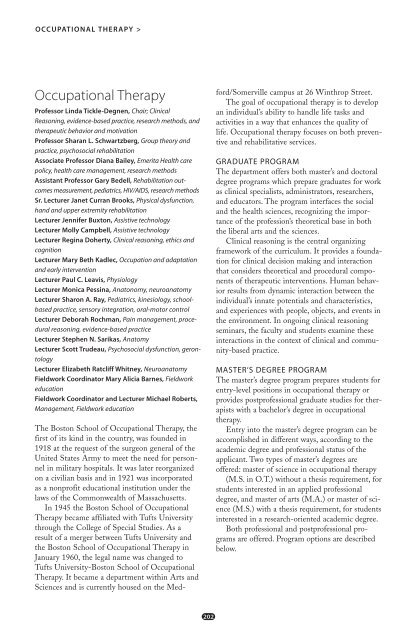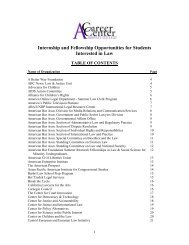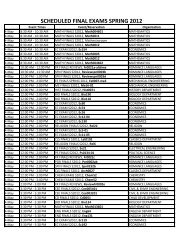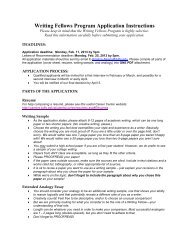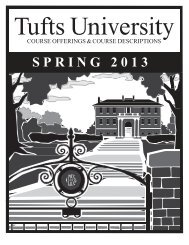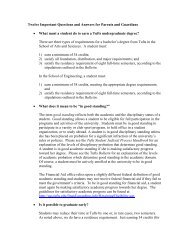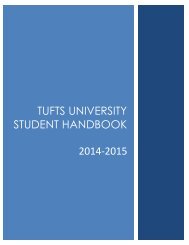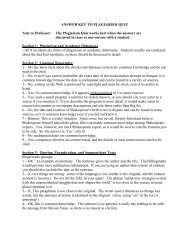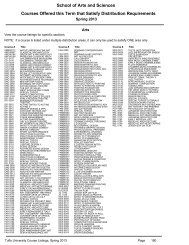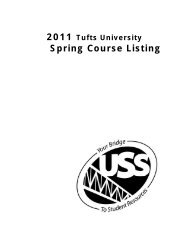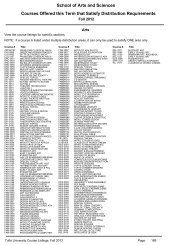The Bulletin - USS at Tufts - Tufts University
The Bulletin - USS at Tufts - Tufts University
The Bulletin - USS at Tufts - Tufts University
- No tags were found...
You also want an ePaper? Increase the reach of your titles
YUMPU automatically turns print PDFs into web optimized ePapers that Google loves.
OCCUPATIONAL THERAPY >Occup<strong>at</strong>ional <strong>The</strong>rapyProfessor Linda Tickle-Degnen, Chair; ClinicalReasoning, evidence-based practice, research methods, andtherapeutic behavior and motiv<strong>at</strong>ionProfessor Sharan L. Schwartzberg, Group theory andpractice, psychosocial rehabilit<strong>at</strong>ionAssoci<strong>at</strong>e Professor Diana Bailey, Emerita Health carepolicy, health care management, research methodsAssistant Professor Gary Bedell, Rehabilit<strong>at</strong>ion outcomesmeasurement, pedi<strong>at</strong>rics, HIV/AIDS, research methodsSr. Lecturer Janet Curran Brooks, Physical dysfunction,hand and upper extremity rehabilit<strong>at</strong>ionLecturer Jennifer Buxton, Assistive technologyLecturer Molly Campbell, Assistive technologyLecturer Regina Doherty, Clinical reasoning, ethics andcognitionLecturer Mary Beth Kadlec, Occup<strong>at</strong>ion and adapt<strong>at</strong>ionand early interventionLecturer Paul C. Leavis, PhysiologyLecturer Monica Pessina, An<strong>at</strong>onomy, neuroan<strong>at</strong>omyLecturer Sharon A. Ray, Pedi<strong>at</strong>rics, kinesiology, schoolbasedpractice, sensory integr<strong>at</strong>ion, oral-motor controlLecturer Deborah Rochman, Pain management, proceduralreasoning, evidence-based practiceLecturer Stephen N. Sarikas, An<strong>at</strong>omyLecturer Scott Trudeau, Psychosocial dysfunction, gerontologyLecturer Elizabeth R<strong>at</strong>cliff Whitney, Neuroan<strong>at</strong>omyFieldwork Coordin<strong>at</strong>or Mary Alicia Barnes, Fieldworkeduc<strong>at</strong>ionFieldwork Coordin<strong>at</strong>or and Lecturer Michael Roberts,Management, Fieldwork educ<strong>at</strong>ion<strong>The</strong> Boston School of Occup<strong>at</strong>ional <strong>The</strong>rapy, thefirst of its kind in the country, was founded in1918 <strong>at</strong> the request of the surgeon general of theUnited St<strong>at</strong>es Army to meet the need for personnelin military hospitals. It was l<strong>at</strong>er reorganizedon a civilian basis and in 1921 was incorpor<strong>at</strong>edas a nonprofit educ<strong>at</strong>ional institution under thelaws of the Commonwealth of Massachusetts.In 1945 the Boston School of Occup<strong>at</strong>ional<strong>The</strong>rapy became affili<strong>at</strong>ed with <strong>Tufts</strong> <strong>University</strong>through the College of Special Studies. As aresult of a merger between <strong>Tufts</strong> <strong>University</strong> andthe Boston School of Occup<strong>at</strong>ional <strong>The</strong>rapy inJanuary 1960, the legal name was changed to<strong>Tufts</strong> <strong>University</strong>-Boston School of Occup<strong>at</strong>ional<strong>The</strong>rapy. It became a department within Arts andSciences and is currently housed on the Medford/Somervillecampus <strong>at</strong> 26 Winthrop Street.<strong>The</strong> goal of occup<strong>at</strong>ional therapy is to developan individual’s ability to handle life tasks andactivities in a way th<strong>at</strong> enhances the quality oflife. Occup<strong>at</strong>ional therapy focuses on both preventiveand rehabilit<strong>at</strong>ive services.GRADUATE PROGRAM<strong>The</strong> department offers both master’s and doctoraldegree programs which prepare gradu<strong>at</strong>es for workas clinical specialists, administr<strong>at</strong>ors, researchers,and educ<strong>at</strong>ors. <strong>The</strong> program interfaces the socialand the health sciences, recognizing the importanceof the profession’s theoretical base in boththe liberal arts and the sciences.Clinical reasoning is the central organizingframework of the curriculum. It provides a found<strong>at</strong>ionfor clinical decision making and interactionth<strong>at</strong> considers theoretical and procedural componentsof therapeutic interventions. Human behaviorresults from dynamic interaction between theindividual’s inn<strong>at</strong>e potentials and characteristics,and experiences with people, objects, and events inthe environment. In ongoing clinical reasoningseminars, the faculty and students examine theseinteractions in the context of clinical and community-basedpractice.MASTER‘S DEGREE PROGRAM<strong>The</strong> master’s degree program prepares students forentry-level positions in occup<strong>at</strong>ional therapy orprovides postprofessional gradu<strong>at</strong>e studies for therapistswith a bachelor’s degree in occup<strong>at</strong>ionaltherapy.Entry into the master’s degree program can beaccomplished in different ways, according to theacademic degree and professional st<strong>at</strong>us of theapplicant. Two types of master’s degrees areoffered: master of science in occup<strong>at</strong>ional therapy(M.S. in O.T.) without a thesis requirement, forstudents interested in an applied professionaldegree, and master of arts (M.A.) or master of science(M.S.) with a thesis requirement, for studentsinterested in a research-oriented academic degree.Both professional and postprofessional programsare offered. Program options are describedbelow.202


